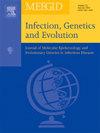Analysis of novel African swine fever variants circulating in wild boars in South Korea isolated in 2021 by deep sequencing
IF 2.6
4区 医学
Q3 INFECTIOUS DISEASES
引用次数: 0
Abstract
African swine fever (ASF) is major infectious disease of concern currently circulating in swine species, causing high mortality and significant economic damage on the global scale. Since the first incident of ASF outbreak in Korea in 2019, the disease has continued to spread throughout the country despite enhanced biosecurity measures, with wild boars playing a key role. Thus, characterizing the domestic African swine fever virus (ASFV) strains including its genetic variants is crucial for both monitoring and diagnostic purposes. In this study, we sequenced and analyzed the full genome of seven Korean ASFV strains isolated from ASFV positive wild boar samples collected in 2021 from various regions. The sequences were compared with previously isolated ASFV strains to track the origin and the evolutionary trend of the ASFV variants residing in the wild boar population in Korea. A total of thirty single-nucleotide polymorphisms (SNPs) were detected which consists of ten synonymous and eighteen non-synonymous mutations, a single mutation at intergenic region (IGR), and a truncation mutation which led to a premature stop codon. Out of the mutations, thirteen were present in the MGF 505-9R gene. All seven strains contained an additional ten-nucleotides (nt) long tandem repeat sequence (TRS) between the I73R and I179L gene, similar to strains previously studied in Korea. Additionally, a new seventeen-nt long tandem repeat sequence insertion, adjacent to the MGF 505-10R, has been observed at the IGR between the MGF 505-9R and 10R genes. The results of the study provide extra insight for characterizing the ASFV virus in Korea and suggesting new molecular genetic markers for epidemiological monitoring, thus minimizing the risk of new ASF outbreaks in Korea.
通过深度测序分析2021年在韩国分离的野猪中流行的新型非洲猪瘟变体
非洲猪瘟(ASF)是目前在猪种中流行的令人关注的主要传染病,在全球范围内造成高死亡率和重大经济损失。自2019年韩国首次出现非洲猪瘟疫情以来,尽管加强了生物安全措施,但疫情仍在全国范围内持续蔓延,其中野猪发挥了关键作用。因此,确定国内非洲猪瘟病毒(ASFV)毒株的特征,包括其遗传变异,对于监测和诊断目的都至关重要。在这项研究中,我们对从2021年从不同地区收集的ASFV阳性野猪样本中分离的7株韩国ASFV毒株进行了全基因组测序和分析。将这些序列与先前分离的ASFV毒株进行比较,以追踪韩国野猪种群中ASFV变异的起源和进化趋势。共检测到30个单核苷酸多态性(SNPs),包括10个同义突变和18个非同义突变,1个基因间区突变(IGR)和1个截断突变(导致过早终止密码子)。在这些突变中,有13个存在于MGF 505-9R基因中。所有菌株在I73R和I179L基因之间都含有一个额外的10个核苷酸(nt)长串联重复序列(TRS),与之前在韩国研究的菌株相似。此外,在MGF 505-10R基因和MGF 505-9R基因之间的IGR上发现了一个新的17 nt长的串联重复序列插入,邻近MGF 505-10R基因。该研究结果为韩国ASFV病毒的特征提供了额外的见解,并为流行病学监测提供了新的分子遗传标记,从而最大限度地降低了韩国新的ASF暴发的风险。
本文章由计算机程序翻译,如有差异,请以英文原文为准。
求助全文
约1分钟内获得全文
求助全文
来源期刊

Infection Genetics and Evolution
医学-传染病学
CiteScore
8.40
自引率
0.00%
发文量
215
审稿时长
82 days
期刊介绍:
(aka Journal of Molecular Epidemiology and Evolutionary Genetics of Infectious Diseases -- MEEGID)
Infectious diseases constitute one of the main challenges to medical science in the coming century. The impressive development of molecular megatechnologies and of bioinformatics have greatly increased our knowledge of the evolution, transmission and pathogenicity of infectious diseases. Research has shown that host susceptibility to many infectious diseases has a genetic basis. Furthermore, much is now known on the molecular epidemiology, evolution and virulence of pathogenic agents, as well as their resistance to drugs, vaccines, and antibiotics. Equally, research on the genetics of disease vectors has greatly improved our understanding of their systematics, has increased our capacity to identify target populations for control or intervention, and has provided detailed information on the mechanisms of insecticide resistance.
However, the genetics and evolutionary biology of hosts, pathogens and vectors have tended to develop as three separate fields of research. This artificial compartmentalisation is of concern due to our growing appreciation of the strong co-evolutionary interactions among hosts, pathogens and vectors.
Infection, Genetics and Evolution and its companion congress [MEEGID](http://www.meegidconference.com/) (for Molecular Epidemiology and Evolutionary Genetics of Infectious Diseases) are the main forum acting for the cross-fertilization between evolutionary science and biomedical research on infectious diseases.
Infection, Genetics and Evolution is the only journal that welcomes articles dealing with the genetics and evolutionary biology of hosts, pathogens and vectors, and coevolution processes among them in relation to infection and disease manifestation. All infectious models enter the scope of the journal, including pathogens of humans, animals and plants, either parasites, fungi, bacteria, viruses or prions. The journal welcomes articles dealing with genetics, population genetics, genomics, postgenomics, gene expression, evolutionary biology, population dynamics, mathematical modeling and bioinformatics. We also provide many author benefits, such as free PDFs, a liberal copyright policy, special discounts on Elsevier publications and much more. Please click here for more information on our author services .
 求助内容:
求助内容: 应助结果提醒方式:
应助结果提醒方式:


